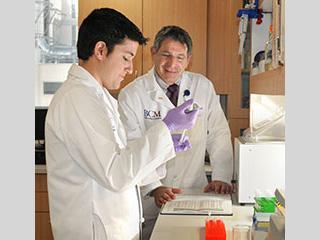
The Paul Klotman laboratory studies HIV-associated nephropathy (HIVAN) and how the kidney responds to HIV infection. HIVAN only afflicts people of African descent, and remains a leading cause of renal disease in the African American community. Additionally, as highly active anti-retroviral therapy (HAART) is introduced to Africa, HIVAN represents a potential epidemic of renal disease.
Previous work by our group definitively established that HIV can cause kidney disease through direct infection of the renal epithelium. We found that the kidney is a reservoir for replicating virus distinct from peripheral blood. Additionally, we have elucidated how HIV disrupts signalling networks within the key filtration cells of the kidney, and how this leads to renal infection.
We also discovered Podocan, an upregulated gene in the setting of HIVAN. Podocan belongs to the small leucine-rich repeat proteins (SLRP), a group of extracellular matrix genes which regulate growth, fibrogenesis and wound healing. We are currently studying the role Podocan plays in mediating HIVAN and other related diseases. Given the importance of other SLRPs in a broad spectrum of diseases, we are also investigating the roles of Podocan in bone and cardiovascular diseases.
Another topic we are investigating is the role of myosin, heavy chain 9 (MYH9) in kidney disease. MYH9 deficiency is known to cause kidney disease, and recent work by other groups has shown that MYH9 genetic variation may explain the African predisposition to HIVAN and other related forms of kidney disease. Our group is actively exploring what role MYH9 has in mediating the pathogenesis of HIVAN, as well as MYH9’s role in maintaining normal kidney function.
Lab Publications
Papeta N, Kiryluk K, Patel A, Sterken R, Kacak N, Snyder HJ, Imus PH, Mhatre AN, Lawani AK, Julian BA, Wyatt RJ, Novak J, Wyatt CM, Ross MJ, Winston JA, Klotman ME, Cohen DJ, Appel GB, D'Agati VD, Klotman PE, Gharavi AG. APOL1 variants increase risk for FSGS and HIVAN but not IgA nephropathy. J Am Soc Nephrol. 2011 Nov;22(11):1991-6.
Shea JA, Stern DT, Klotman PE, Clayton CP, O'Hara JL, Feldman MD, Griendling KK, Moss M, Straus SE, Jagsi R. Career development of physician scientists: a survey of leaders in academic medicine. Am J Med. 2011 Aug;124(8):779-87.
Medapalli RK, He JC, Klotman PE. HIV-associated nephropathy: pathogenesis. Curr Opin Nephrol Hypertens. 2011 May;20(3):306-11.
Hostetter TH, Kochis DJ, Shaffer RN, Chertow G, Harmon WE, Klotman PE, Powe NR, Sedor JR, Smedberg PC, Watnick S, Winkelmayer WC; ASN Public Policy Board. World Kidney Day 2011. J Am Soc Nephrol. 2011 Mar;22(3):397-8.
Chen P, Chen BK, Mosoian A, Hays T, Ross MJ, Klotman PE, Klotman ME. Virological synapses allow HIV-1 uptake and gene expression in renal tubular epithelial cells. J Am Soc Nephrol. 2011 Mar;22(3):496-507.
Ratnam KK, Feng X, Chuang PY, Verma V, Lu TC, Wang J, Jin Y, Farias EF, Napoli JL, Chen N, Kaufman L, Takano T, D'Agati VD, Klotman PE, He JC. Role of the retinoic acid receptor-α in HIV-associated nephropathy. Kidney Int. 2011 Mar;79(6):624-34.
Wyatt CM, Meliambro K, Klotman PE. Recent progress in HIV-associated nephropathy. Annu Rev Med. 2012;63:147-59.
Wyatt CM, Hoover DR, Shi Q, Tien PC, Karim R, Cohen MH, Goderre JL, Seaberg EC, Lazar J, Young MA, Klotman PE, Anastos K. Pre-existing albuminuria predicts AIDS and non-AIDS mortality in women initiating antiretroviral therapy. Antivir Ther. 2011;16(4):591-6.
Wyatt CM, Hoover DR, Shi Q, Seaberg E, Wei C, Tien PC, Karim R, Lazar J, Young MA, Cohen MH, Klotman PE, Anastos K. Microalbuminuria is associated with all-cause and AIDS mortality in women with HIV infection. J Acquir Immune Defic Syndr. 2010 Sep;55(1):73-7.
Kaufman L, Potla U, Coleman S, Dikiy S, Hata Y, Kurihara H, He JC, D'Agati VD, Klotman PE. Up-regulation of the homophilic adhesion molecule sidekick-1 in podocytes contributes to glomerulosclerosis. J Biol Chem. 2010 Aug 13;285(33):25677-85.
Collaborators
Debbie Hyink, Ph.D.
Baylor College of Medicine
John Cijiang He, M.D., Ph.D.
Mount Sinai School of Medicine
Ravi Iyengar, Ph.D.
Mount Sinai School of Medicine
Mary Klotman, M.D.
Duke University School of Medicine
Avi Ma’ayan, Ph.D.
Mount Sinai School of Medicine
Weijia Zhang, Ph.D.
Mount Sinai School of Medicine







